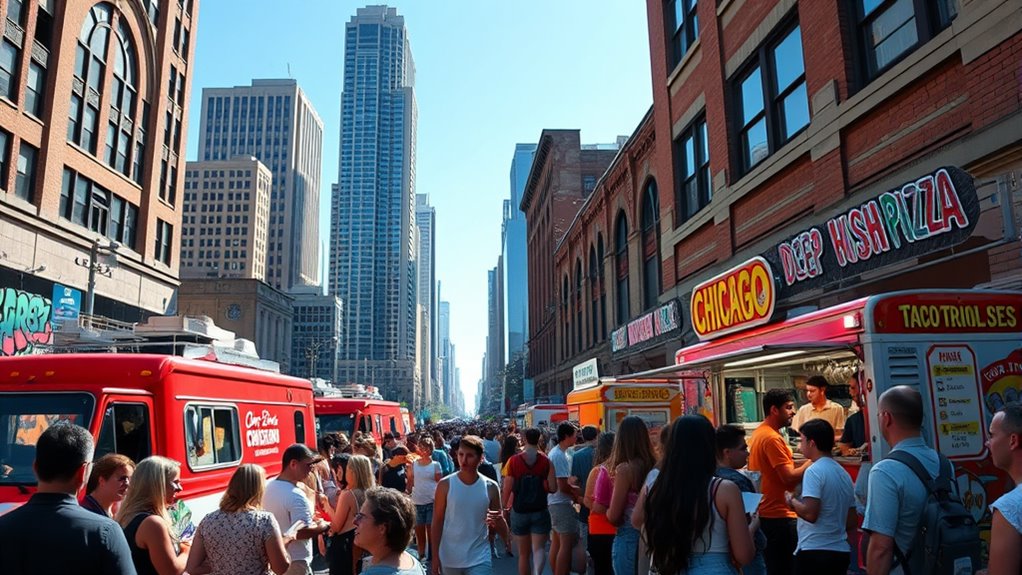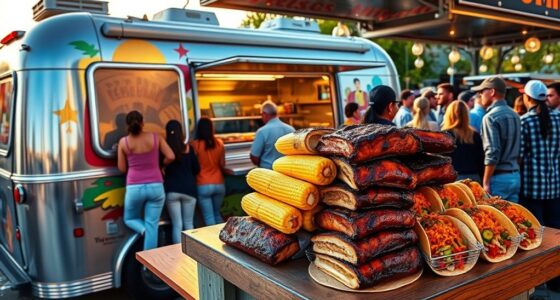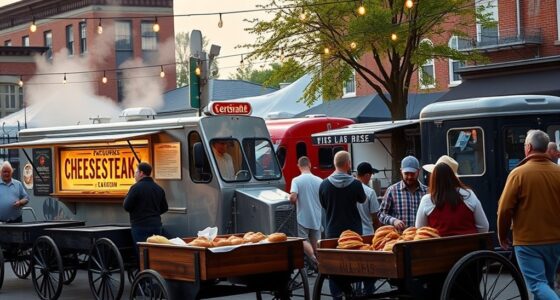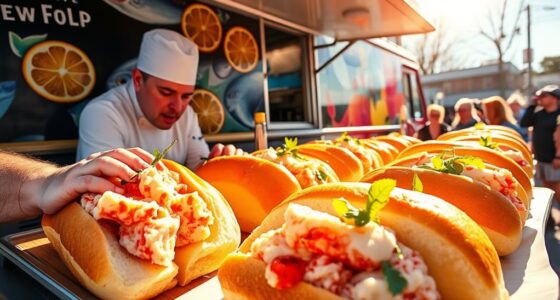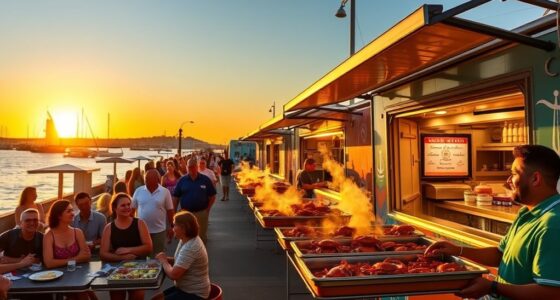In Chicago, food trucks serve up iconic deep-dish pizza and inventive urban eats inspired by diverse cultural influences like Korean-Mexican fusion and Asian-American flavors. They operate across neighborhoods and events, offering quick, customizable meals that reflect the city’s vibrant culinary scene. Thanks to innovative technology and flexible regulations, trucks are continually pushing creative boundaries. If you keep exploring, you’ll discover how Chicago’s food trucks combine tradition with modern twists in every bite.
Key Takeaways
- Chicago food trucks offer iconic deep-dish pizza on wheels, providing quick, cultural, and innovative dining experiences.
- The city’s vibrant street food scene includes fusion dishes like Korean-Mexican and Asian-American bites.
- Food trucks operate seasonally with permits, strict regulations, and location restrictions, ensuring diverse urban eats.
- Major events and neighborhoods like Millennium Park and Wrigleyville showcase urban eats and attract large crowds.
- Technology integration such as digital payments, pre-order apps, and GPS routing enhances customer engagement and efficiency.
The Rise of Food Trucks in Chicago’s Culinary Scene
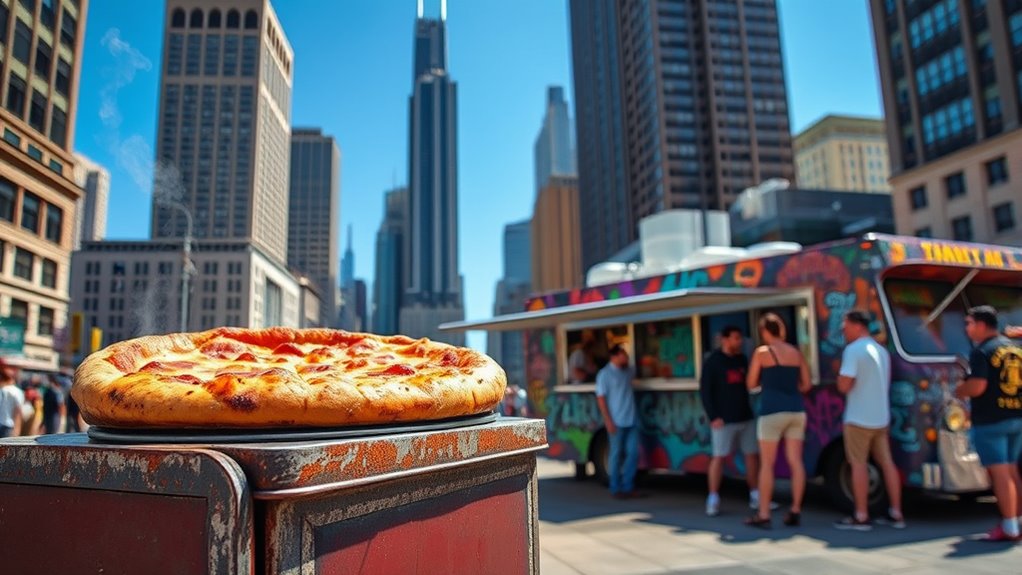
Chicago’s food truck scene has experienced notable growth, adding vibrant options to the city’s diverse culinary landscape. Currently, about 100 to 200 active food trucks operate seasonally, mainly during warmer months, offering international street foods, desserts, and gourmet drinks that complement traditional dining. Nationwide, food truck numbers increased by 15.9% from 2018 to 2024, reflecting growing consumer interest. In Chicago, licensed trucks fall into two categories: “Mobile Food Dispensers” and “Mobile Food Preparers,” highlighting the city’s unique regulations. Although they remain a small part of Chicago’s over 7,300 restaurants, food trucks contribute markedly to culinary diversity and innovation. Despite the challenges, their presence signals a steady demand for convenient, flavorful, and diverse street-level dining experiences in the city. Additionally, the evolving technology used in food trucks enhances efficiency and customer engagement.
Navigating the Regulatory Landscape for Mobile Vendors
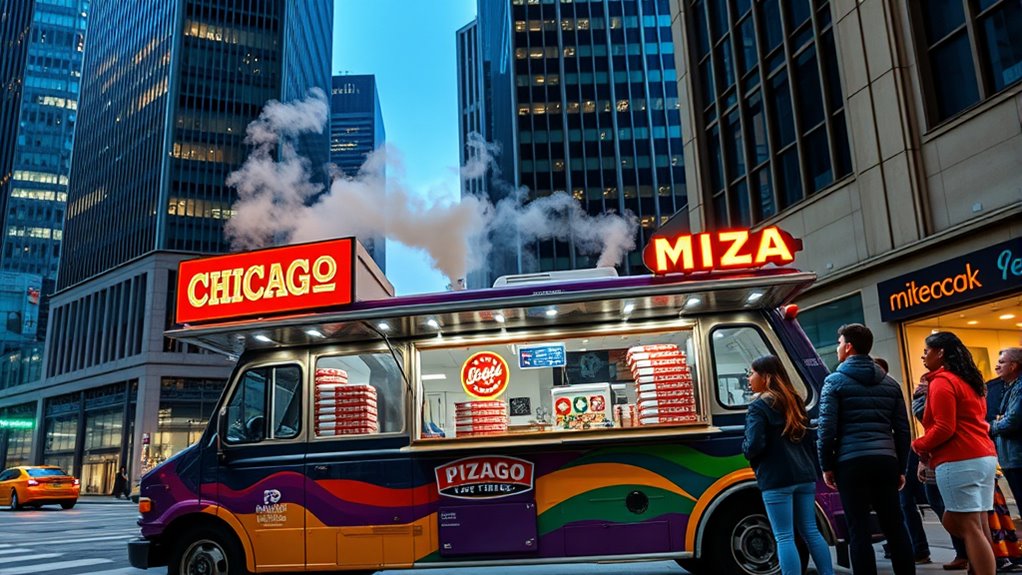
You need to understand the licensing, permits, and operating restrictions to run a food truck legally in Chicago. Maneuvering these regulations can be complex, with requirements for safety inspections, commissary use, and equipment standards. Staying compliant also means managing enforcement challenges that can impact your daily operations. Additionally, it is important to keep up with updates to city policies and ensure timely renewals to avoid penalties for license renewal. Familiarity with dog names can also help in branding your food truck, making it more memorable to customers.
Licensing and Permits
Guiding the licensing and permit requirements for food trucks in Chicago involves understanding a range of regulations designed to ensure safety and compliance. You’ll need specific licenses like the Mobile Food Dispenser (MFD) for pre-packaged food, or the Mobile Food Preparer (MFP) if preparing food onboard. The Mobile Food Vehicle (MFV) license covers the vehicle itself. Additionally, you must obtain a Food Sanitation Manager Certificate, fire safety permits if using gas or propane, and liability insurance with at least $350,000 coverage. You’ll submit documentation like your EIN, vehicle registration, proof of business, and a signed commissary letter. The application process includes health consultations, vehicle inspections, and background checks. Licenses are valid for two years and must be renewed with updated inspections and consultations. Creativity can be fostered during the licensing process by exploring innovative approaches to compliance and safety.
Operating Restrictions
Guiding the operating restrictions for mobile vendors in Chicago requires careful attention to geographic, time-based, and location-specific rules designed to ensure public safety and neighborhood harmony. You can’t operate within 200 feet of a brick-and-mortar restaurant, and certain streets or zones are off-limits to prevent congestion and protect pedestrian flow. You must avoid parking within 20 feet of crosswalks, 30 feet of traffic signals, or near protected bike lanes. Operating hours are generally from 5 AM to 2 AM, with some exceptions for special events. Time limits, usually four hours per location, promote turnover. Additionally, downtown areas with high pedestrian traffic restrict mobile food vendors. Always verify zoned parking zones and adhere to fire safety and health standards to stay compliant. The Illinois Supreme Court’s recent ruling supports the validity of these regulations, underscoring their role in maintaining order and safety in urban environments. Implementing secure payment solutions can also streamline transactions and help vendors meet compliance standards more efficiently.
Enforcement Challenges
Navigating Chicago’s regulatory landscape presents significant enforcement challenges for mobile food vendors. Authorities enforce licensing rules strictly, issuing hefty fines and confiscating equipment or products for unauthorized sales on public or Park District property. As enforcement extends to include park areas, vendors face increased scrutiny. Location restrictions, like the 200-foot rule from fixed restaurants, are enforced with GPS tracking, which monitors compliance but raises privacy concerns. Violations lead to fines and legal repercussions, limiting where trucks can operate. Health and safety regulations add another layer of oversight, requiring regular inspections and permits, with non-compliance risking license revocation. Additionally, operational time limits and designated zones are enforced through fines and relocation mandates. These layered enforcement measures create a complex regulatory environment that vendors must navigate carefully to stay compliant. The city plans to increase enforcement against unlicensed vendors starting summer 2025, further complicating compliance efforts for mobile vendors.
Furthermore, the regulatory complexity requires vendors to stay continually informed about changing laws and policies to avoid penalties.
Popular Cuisine Types and Unique Urban Eats

Chicago food trucks serve up a wide range of ethnic street foods, from Korean BBQ to Polish pierogi, reflecting the city’s diverse communities. You’ll also find specialty coffee and craft beverages that keep urban commuters energized throughout the day. Plus, fusion dishes like Korean-Mexican tacos bring creative twists to classic flavors on the streets. Recent technological advancements have made it easier for food trucks to promote their offerings and attract new customers through digital platforms, including payment processing solutions that ensure secure transactions.
Ethnic Street Food Varieties
Ethnic street foods bring vibrant flavors and cultural diversity to Chicago’s food truck scene, offering a wide range of popular cuisines and innovative urban eats. You’ll find tacos packed with carne asada or vegetarian fillings, often at local festivals like Chi Food Truck Fest. Latin American snacks like elote, topped with cheese, chili, and lime, are favorites, along with pupusas—thick corn tortillas stuffed with cheese or meat. Empanadas, with their varied fillings, showcase Chicago’s cultural mix. Fusion tacos blending Latin influences with global flavors stand out in the city’s urban eats. Asian options include Korean BBQ tacos, bao buns, ramen, pho, and spring rolls. Middle Eastern staples like falafel and shawarma, along with Caribbean jerk chicken and West African jollof rice, add even more diversity to the city’s street food scene. Industry shows strong growth potential, attracting many entrepreneurs to the vibrant Chicago food truck market. This dynamic environment is further energized by Chicago’s diverse culinary landscape, which continually influences and expands the city’s street food offerings.
Gourmet Coffee & Beverages
Gourmet coffee and beverage offerings on food trucks have evolved into a vibrant part of the urban dining scene, with vendors serving up more than just traditional brews. You’ll find espresso-based drinks like lattes, cappuccinos, and macchiatos, along with cold brew favored for its smooth flavor and caffeine kick. Specialty trucks emphasize single-origin beans and artisanal brewing methods such as pour-over and siphon. Vegan and dairy-alternative milks, like oat and almond, are widely available. Seasonal drinks, like pumpkin spice lattes or iced matcha, keep customers coming back. Here’s a quick look at popular options: Food trucks provide an extension for restaurant brands to reach new customers and increase business. | Beverage Type | Unique Offerings | Best Time to Try |
| ———————— | —————————————- | ——————— |
|---|---|---|
| Espresso Drinks | Single-origin beans, pour-over | Morning/All day |
| Cold Brew | Smooth, high caffeine | Summer |
| Specialty & Seasonal | Pumpkin spice, iced matcha | Fall/Summer |
| Non-Coffee Beverages | Craft sodas, bubble tea, mocktails | Anytime. Additionally, some trucks incorporate sustainable practices like compostable cups and local sourcing to appeal to eco-conscious consumers. |
Fusion & Innovative Dishes
Fusion and innovative dishes have become a defining feature of Chicago’s food truck scene, offering bold flavors and creative combinations that excite the palate. You’ll find trucks like Chicago Lunchbox, which fuses Vietnamese banh mi with sliders and tacos, and Yum Dum, blending Chinese cuisine with fast food. Aztec Dave’s delivers authentic Mexican flavors, while La Cocinita serves Venezuelan arepas, reflecting diverse culinary influences. Korean-Mexican fusion, like BBQ tacos, and Asian-American creations, such as Bahn Mi sliders and egg rolls with Western twists, are especially popular. Signature dishes like the Tenderizer sandwich, sushi burritos, and butter chicken nachos showcase inventive takes on classic favorites. These fusion options appeal to health-conscious and adventurous eaters, offering quick, flavorful meals at moderate prices, fueled by Chicago’s multicultural vibe.
Deep-Dish Pizza: A Chicago Icon on Wheels

Chicago’s deep-dish pizza has become a beloved culinary icon, and now you can enjoy it on wheels thanks to specialized food trucks. These mobile pizzerias bring Chicago’s signature thick crust and hearty toppings beyond traditional restaurants, making it easy to satisfy your craving on the go. Many trucks serve personal-sized slices in under five minutes, perfect for busy urban life, while others offer a variety of sides like salads and cookies. The trucks also act as cultural ambassadors, spreading Chicago’s food heritage across different cities. Minority-owned businesses add diversity to the scene, showcasing Chicago’s entrepreneurial spirit.
| Key Aspect | Impact |
|---|---|
| Traditional recipes | Authentic flavor |
| Quick service | Convenience |
| Mobile access | Broader reach |
| Cultural pride | Community connection |
| Diversity | Economic inclusion |
How Food Trucks Are Innovating Traditional Flavors

Food trucks in Chicago aren’t just serving traditional flavors—they’re reimagining them with creative twists that excite your palate. Asian fusion trucks like Yum Dum blend Korean chili chicken with steamed buns and dumplings, adding bold, unexpected flavors. Bao Trio lets you customize fillings such as braised pork belly, crispy shrimp, and vegetarian Tofu Bao, pushing ingredient variety. Kimcheesy Rice Balls fuse spicy and cheesy elements within classic Asian street snacks. Meanwhile, Global Flavors on Wheels showcases authentic international cuisines—Mexican, Indian, Thai—translating traditional dishes into mobile-friendly formats with vibrant spices and colorful presentations. These trucks blend authenticity with innovation, offering fusion dishes and modern takes on comfort foods, making traditional flavors fresh, exciting, and accessible on the go. Incorporating targeted segmentation strategies can help these trucks reach specific customer preferences and improve engagement.
The Role of Technology in Modern Food Truck Operations
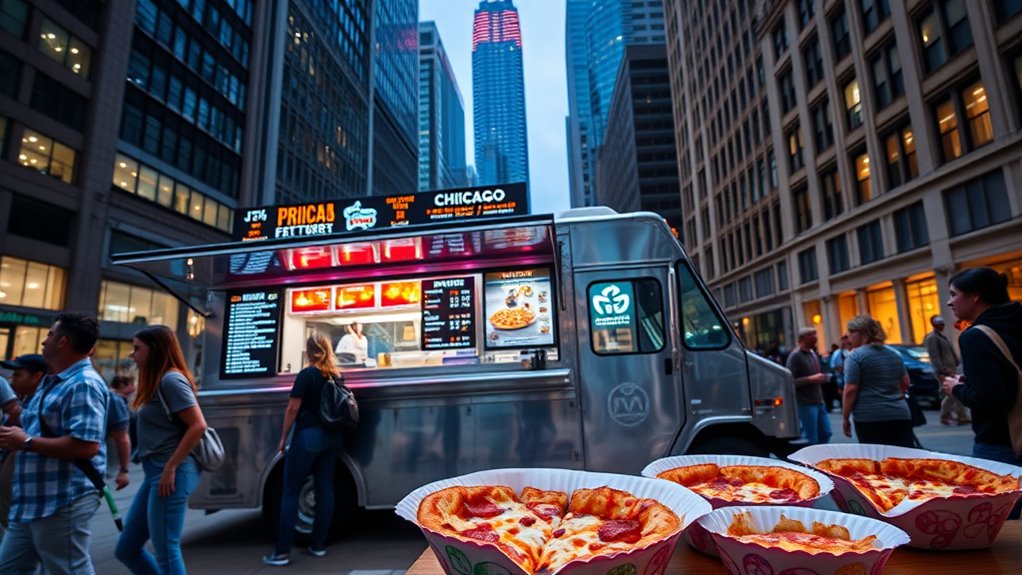
Technology plays a crucial role in modern food truck operations by streamlining processes and enhancing customer experience. Contactless payments via mobile wallets, NFC, and QR codes make transactions faster and safer, especially post-pandemic. Mobile apps allow customers to order ahead, reducing wait times and ensuring accuracy. On-site, tablets and smartphones replace traditional cash registers, minimizing cash handling and theft risks. Inventory management tools track stock in real-time, automating restock alerts and streamlining supply chain logistics. GPS and route optimization keep trucks efficient and punctual. Marketing tools like social media and digital coupons boost customer engagement, while data analytics provide insights into sales trends and customer preferences. AI security technologies collectively boost operational efficiency, reduce costs, and improve service quality in Chicago’s vibrant food truck scene.
Neighborhoods and Events: Where Food Trucks Thrive
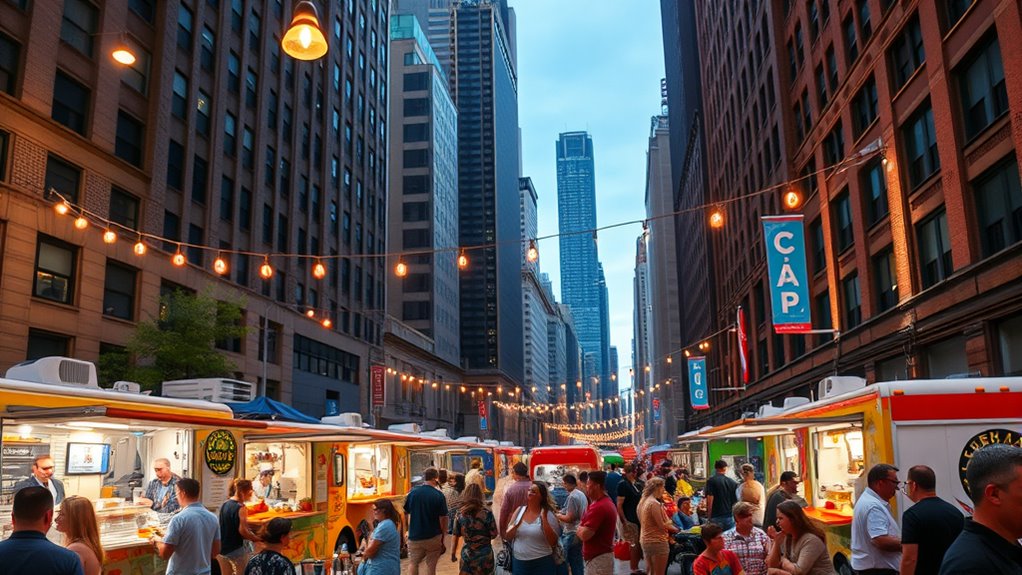
Neighborhoods and events provide prime opportunities for food trucks to thrive in Chicago. In areas like The Loop, you’ll find food trucks catering to office workers and tourists, especially near skyscrapers like Willis Tower. Millennium Park is bustling during events and weekends, drawing crowds to food vendors. Hyde Park’s year-round scene benefits from the University of Chicago and community gatherings. Wrigleyville and Lakeview host trucks serving fans during game days at Wrigley Field. Downtown spots near office buildings attract midday lunch crowds. Major festivals like Taste of Chicago and summer events like Chicago SummerDance showcase dozens of trucks. Seasonal farmers markets and neighborhood fairs also draw consistent foot traffic, making Chicago’s neighborhoods and occasions essential for food truck success. Additionally, the proximity of Chicago food trucks to nearby cities helps expand options and attract a diverse range of customers throughout the region.
Challenges and Opportunities for Chicago Food Truck Entrepreneurs
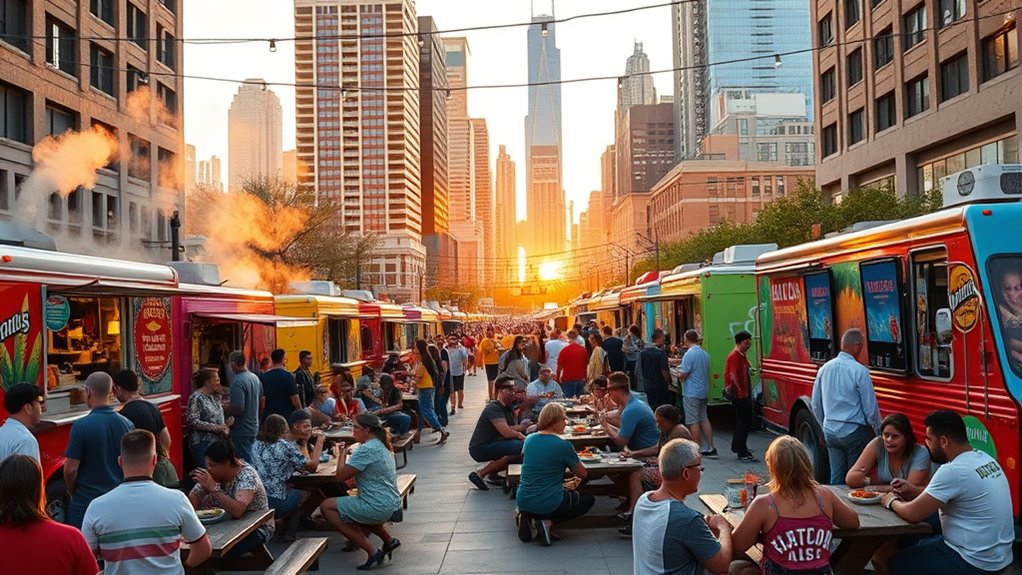
Managing Chicago’s complex licensing and regulatory landscape presents significant hurdles for food truck entrepreneurs. You must obtain a Mobile Preparer or Mobile Food Dispenser license, operate with a licensed commissary, and pass vehicle inspections for health and fire safety. Strict location rules also apply:
- No parking within 200 feet of restaurants (except midnight–2 a.m.).
- Limited four-hour service windows in certain zones.
- GPS tracking requirements for compliance.
- Operating on private property requires zoning approval.
These regulations increase costs and logistics challenges, including frequent relocations and vehicle maintenance. However, Chicago’s large, food-loving population and vibrant event scene present opportunities for visibility, community engagement, and potential late-night markets. The city’s new ordinance also allows food trucks to prepare “food to order” on board, which can help entrepreneurs offer fresher, more customized menu options and attract a wider customer base. Charting these hurdles wisely can position you for success in a competitive environment.
Future Trends Shaping Chicago’s Food Truck Industry

As Chicago’s food truck industry evolves, innovative technologies are transforming how you operate and connect with customers. Digital POS systems cut wait times and enable mobile orders, making service faster and more convenient. Offline payment options keep your truck running smoothly during connectivity issues. Data analytics and feedback tools help you refine menus and improve efficiency. AR and VR are emerging for marketing, creating immersive experiences that attract new customers. Plus, partnering with delivery platforms extends your reach beyond physical locations and promotes contactless transactions.
| Technology | Impact | Emotional Effect |
|---|---|---|
| Digital POS | Faster service, happier customers | Excitement for innovation |
| Offline Payments | Reliability in connectivity | Confidence in operations |
| Data Analytics | Smarter menu choices | Trust in your expertise |
| AR/VR Marketing | Engaging customer experiences | Inspiration to stand out |
| Delivery Platforms | Broader audience, contactless | Freedom to grow your brand |
Frequently Asked Questions
How Do Food Trucks Impact Chicago’S Traditional Restaurant Industry?
You might think food trucks threaten traditional restaurants, but in Chicago, they actually coexist and even complement each other. Regulations limit competition, so trucks don’t cut into restaurant sales markedly. Instead, they attract different crowds, especially younger diners, boosting overall dining demand. Food trucks provide diverse options and encourage neighborhood vibrancy, helping the restaurant scene grow without displacing established establishments. Their presence supports a dynamic, varied food culture in the city.
What Are the Most Popular Times and Locations for Food Trucks in Chicago?
Like bees buzzing around a hive, food trucks gravitate to Chicago’s hotspots during peak times. You’ll find them mainly between 11 am and 3 pm, especially at Daley Plaza during the Chi Food Truck Fest on Fridays. They operate in approved lots, avoiding restaurants within 200 feet. Their locations shift every two hours, creating a lively, ever-changing street food scene that keeps both locals and visitors enthusiastic for more.
How Do Food Trucks Source Ingredients Locally in Chicago?
You can see how food trucks in Chicago source ingredients locally by partnering directly with nearby farms and urban agriculture projects. They visit farmers’ markets and use online directories like Local Harvest to find reputable suppliers. Many also grow herbs and vegetables in rooftop gardens or vacant lots. By focusing on seasonal produce, they guarantee fresh flavors while supporting sustainability, all of which helps boost their brand’s authenticity and community connection.
What Permits and Licenses Are Required to Start a Food Truck in Chicago?
To get your food truck rolling in Chicago, you’ll need some key approvals. First, apply for either a Mobile Food Dispenser or Preparer License, depending on your food prep style. You’ll also need a fire safety permit if using propane, a health inspection, and a valid Food Sanitation Manager Certificate. Confirm your vehicle’s registered, GPS-equipped, and stored at a compliant commissary. Finally, provide proof of insurance and personal identification to meet city requirements.
How Are Food Trucks Promoting Sustainability and Eco-Friendly Practices?
You see, food trucks promote sustainability by sourcing ingredients locally, which reduces transportation emissions and supports nearby farmers. They use biodegradable or recyclable serving ware to cut plastic waste and implement composting programs for food scraps and oil. Many adopt energy-efficient appliances and bio-diesel fuels, lowering their carbon footprint. By practicing these eco-friendly steps, you help minimize environmental impact and promote a greener, more sustainable food industry.
Conclusion
As you explore Chicago’s vibrant food truck scene, you’ll discover a city where tradition and innovation collide on every corner. Like a well-crafted deep-dish pizza, this industry layers flavor, passion, and resilience. So, next time you see a mobile cart, remember—you’re not just grabbing a bite; you’re part of a dynamic culinary adventure shaping Chicago’s future. Immerse yourself, and let your appetite for urban eats lead the way!
